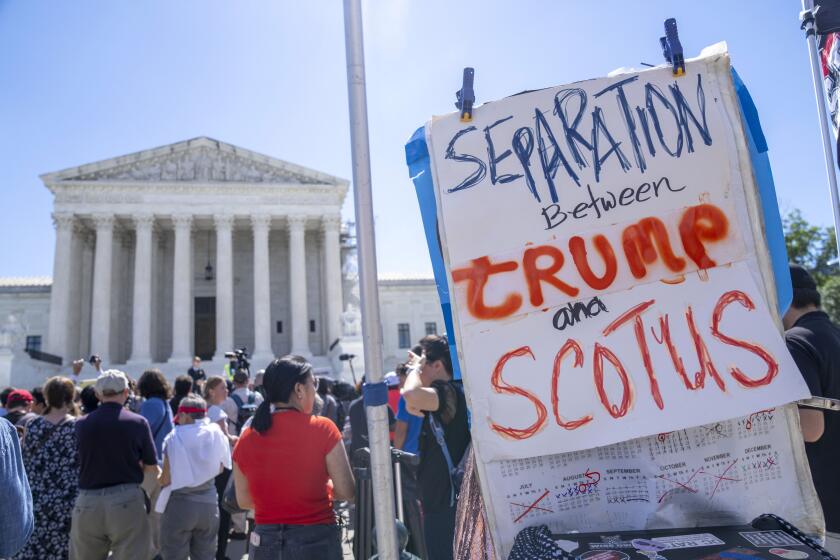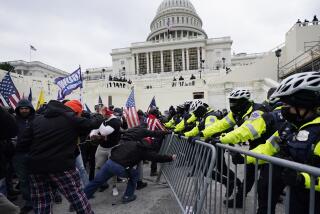Mike Pence’s story is crucial to the Jan. 6 case against Trump. Can Jack Smith still use it?

- Share via
Even before special counsel Jack Smith submitted his extensive and revealing recent brief in the Jan. 6 case, it was evident that Donald Trump’s statements to then-Vice President Mike Pence would become a crucial legal battleground.
The brief plows through every snippet of the evidence Smith proposes to use to prosecute Trump for his efforts to overturn the 2020 election. It focuses particularly on the admissibility of the Pence evidence under the Supreme Court’s expansive immunity opinion, which gives the president a wide berth to engage in otherwise illegal conduct.
Smith’s arguments to salvage Pence’s account are more nuanced and complicated than has been widely appreciated. The special counsel is effectively hedging his bets in this all-important wager on the Pence evidence. He serves up a series of theories for admitting the incendiary proof of Trump’s alleged weeks-long campaign to browbeat Pence into violating the Constitution and disregarding bona fide electoral votes for Joe Biden.
Litman: Donald Trump is waging one last battle to bottle up the Jan. 6 case until election day
The former president’s lawyers are trying to prevent disclosure of special counsel Jack Smith’s extensive court filing detailing the election interference case.
In response to the immunity opinion, the special counsel dropped a whole chapter of alleged crimes involving former Assistant Atty. Gen. Jeffrey Clark and the Department of Justice. He likewise pared back most of the interactions involving White House lawyers, especially top counsels Pat Cipollone and Patrick Philbin. The Supreme Court’s ruling took specific aim at such evidence, holding that it involved exercises of core presidential power that could not be subject to charges or even use in a criminal prosecution.
By contrast, the court did not categorically rule out use of the Pence evidence. But it did construct a daunting obstacle course for Smith to traverse to have a shot at presenting the former vice president’s story.
The court held that whenever the president and vice president discuss their official responsibilities, it’s official conduct and therefore presumed immune from prosecution and consideration. That includes Trump’s relentless bullying of Pence.
The court further held that the presumption could be overcome by showing that a prosecution for the conduct poses no danger of intruding on the authority and functions of the executive branch.
Litman: After the Supreme Court’s immunity ruling, can Donald Trump still be tried for Jan. 6?
The conservative justices granted presidents broad protection for official acts. That appears to include much of the conduct in the federal Jan. 6 indictment.
The court also dropped an equivocal hint about how Smith might overcome the presumption of immunity. Because the vice president presides over Congress’ election certification in his constitutional role as a legislative rather than an executive official, the court wrote, prosecutors “may argue” that the communications with Pence about those proceedings don’t intrude on presidential authority.
In the very next breath, however, the court added that the president may frequently rely on the vice president to advance his or her agenda in Congress, and criminalizing that kind of conduct could “hinder the President’s ability to perform his constitutional functions.”
No sophisticated lawyer would rely heavily on any of this doublespeak. Smith must recognize that however U.S. District Judge Tanya Chutkan rules, a higher court could forbid consideration of much of Trump’s cajoling of Pence on the ground that it would threaten to intrude on executive authority.
But the Pence evidence is just too potent to abandon. Smith’s brief devotes no fewer than 25 pages to reciting dozens of the former president’s statements to and about his vice president and detailing the extensive efforts of Trump and his co-conspirators to get Pence to do their unconstitutional bidding.
Smith’s brief includes a long discussion of how and why the Constitution must prevent the president from deciding the outcome of the election. That serves to shore up the court’s ambivalent acknowledgment of the vice president’s dual role.
But the special counsel doesn’t leave it at that. He serves up several alternative arguments for admitting at least some of the incendiary evidence involving Pence.
Smith characterizes many of the interactions as not between a president and vice president acting in their official capacities but rather between running mates in the 2020 election. The conversations were therefore unofficial conduct by candidates, he argues.
Pence’s private weekly meals with Trump were one important source of Trump’s statements and a subject of extensive grand jury testimony. That includes his account of trying to encourage Trump “as a friend” to recognize that the electoral process was “over.” Smith argues that in this setting, Pence and Trump should be seen not as officials but as candidates with no constitutional stature.
In addition, Smith tries to carve out interactions involving top Pence aides Marc Short and Greg Jacob — another fecund source of evidence related to the former vice president — as unofficial for the immunity opinion’s purposes because “the defendant was not involved and did not otherwise direct” their conduct.
Smith also argues that meetings in which Trump included his bottom-of-the-barrel private lawyers while excluding official White House attorneys were inherently private. He contends that the former president’s phone calls with members of the same gang — whom Pence called a “gaggle of crackpot lawyers” — are similarly fair game.
The net effect of all these arguments is to increase the probability that some of Pence’s powerful testimony will ultimately be admissible at trial. While the Supreme Court will likely insist on its prerogative to apply its newly minted immunity doctrine to the evidence, some of Smith’s arguments turn on factual and contextual claims — for example, that Pence and Trump were dining as candidates rather than as officials — that the court is normally averse to reviewing.
It’s going to be a long slog, with at least one more trip through the federal courts — unless, that is, Trump wins the election and shuts down the prosecution. But Smith’s multiple fallback positions might yet permit a jury to weigh a powerful and persuasive account of some of the former president’s most corrosive conduct.
Harry Litman is the host of the “Talking Feds” podcast and the “Talking San Diego” speaker series. @harrylitman
More to Read
A cure for the common opinion
Get thought-provoking perspectives with our weekly newsletter.
You may occasionally receive promotional content from the Los Angeles Times.









